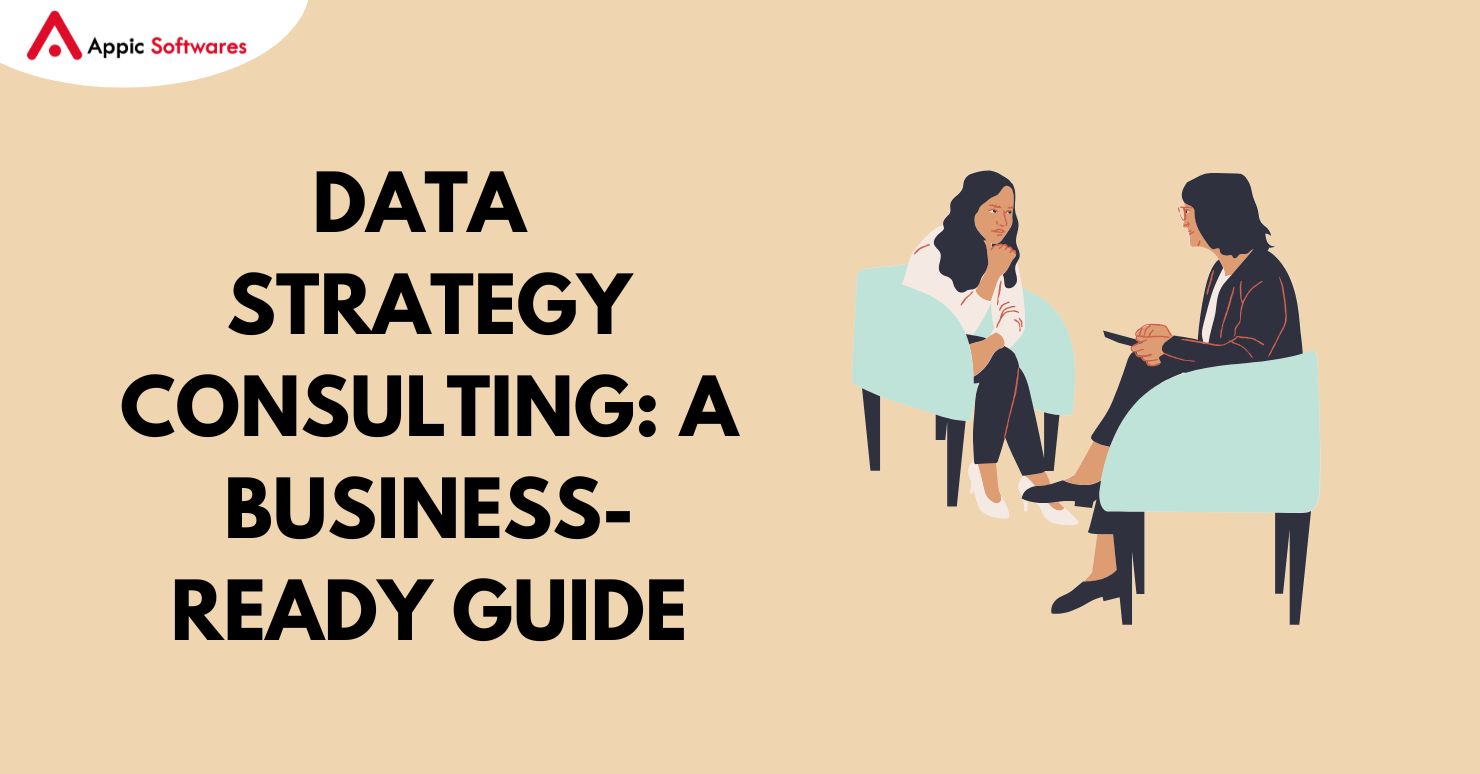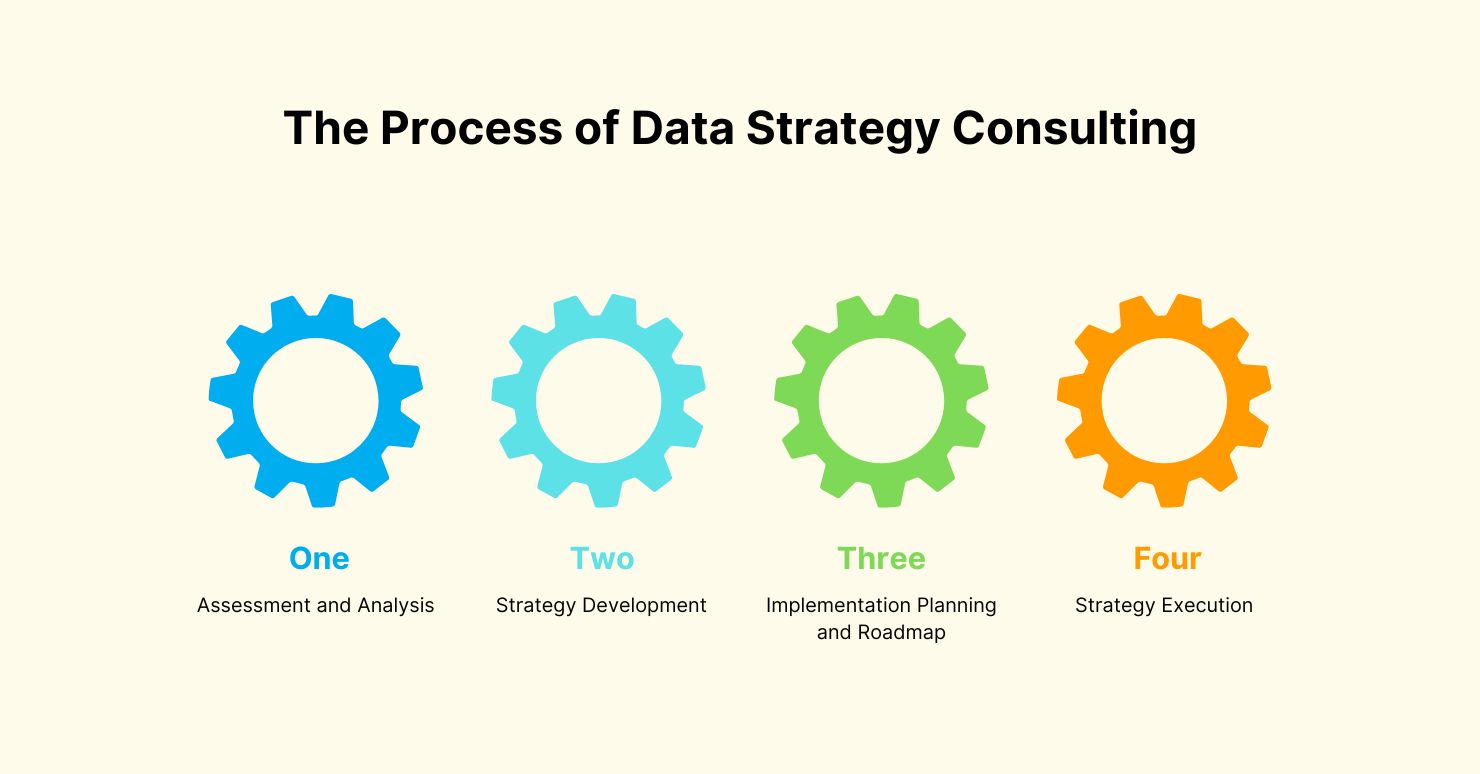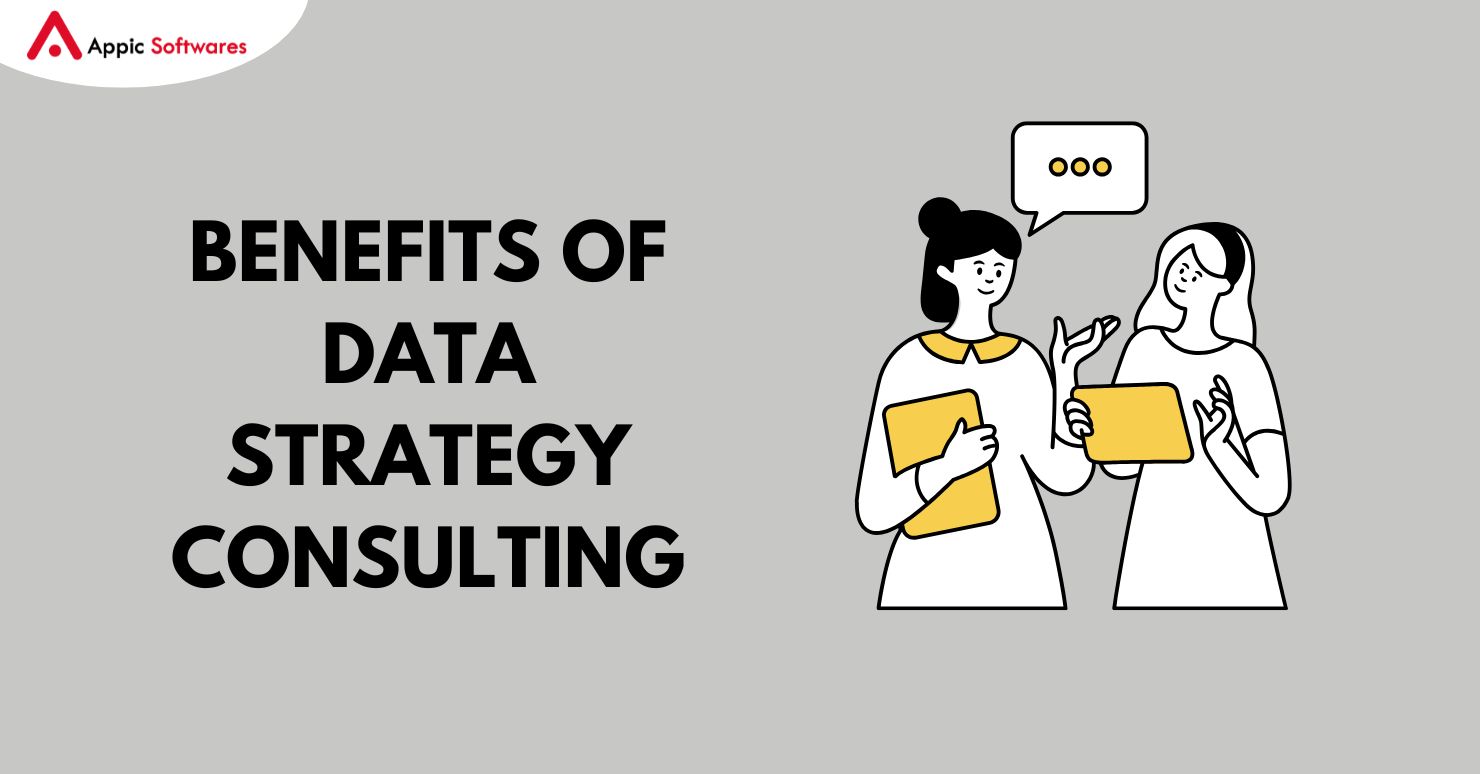
Data strategy consulting helps you through the process and allows you to make faster decisions and achieve better results out of your information. Businesses that understand how to handle and utilize their data better are in a position to make better decisions, become efficient, and outsmart their competitors. Businesses can maximize the value of every byte of data they collect. For businesses managing rapid scaling, it may also be beneficial to explore strategies such as web development outsourcing to support digital transformation goals. The processing of data is not always simple, though.
Some challenges, such as dispersion, incomplete data, low quality, and unclear guidelines on data handling, can be witnessed in many businesses. Here is just where data strategy consulting comes in. It gives us a method of transforming data into a resource that makes a difference. Here, we’ll discuss what data strategy consulting is, why it’s essential, how it works, its benefits, and tips for choosing the right consultant.
What is Data Strategy Consulting?
Data strategy consulting is aimed at turning crude information into strategic use. For example, a retail firm that gathers information on purchases by customers, but the data is idle without a plan. Data strategy consultants assist organizations with this data, analyze it to derive the trends, and use the findings to determine what to stock. This way, they help businesses to use an informed plan that initiates growth and innovation. According to Intellias proper data strategy eliminates data silos and aligns data initiatives with strategic objectives by setting businesses on the path to success.
Data strategy consulting services encompass a broad range of activities, from evaluating existing data systems to implementing new technologies. They often include big data strategy consulting, which focuses on handling large volumes of data, and data analytics strategy consulting, which emphasizes turning data into actionable insights. Similar to how industries are revolutionizing operations through data analytics in healthcare, other sectors can transform decision-making through data strategy.
Why Businesses Need Data Strategy Consulting
Businesses today generate massive amounts of data, but many struggle to use it effectively. Common challenges include:
- Data Silos: Data is stored in different departments or systems, making it hard to access or combine. For instance, sales data might be separate from marketing data, preventing a complete view of customer behavior.
- Poor Data Quality: Inaccurate, incomplete, or outdated data leads to unreliable insights. Gartner estimates that poor data quality costs organizations an average of $15 million per year.
- Lack of Data Governance: Without clear rules, data management becomes chaotic, increasing risks like data breaches or non-compliance with regulations.
- Difficulty Deriving Insights: Many businesses have data but lack the tools or expertise to analyze it, missing out on valuable opportunities.
Data strategy consulting services address these issues by providing expert guidance and a structured approach. Consultants assess the current data landscape, identify gaps, and develop tailored solutions. For example, they might implement a data governance framework to ensure data quality and security or introduce a
nalytics tools to uncover hidden patterns. This helps businesses turn their data into a strategic asset, driving better decisions and competitive advantages.
Moreover, data strategy consulting is important today. Research suggests that companies with a robust data strategy outperform their competitors. A study by Accenture found that data-driven organizations with an enterprise-wide data strategy grow at an average of over 30% annually. This growth comes from using data to improve customer experiences, streamline operations, and innovate new products or services.
The Process of Data Strategy Consulting

Data strategy consulting follows a structured process to ensure that data initiatives align with business goals. Here’s a detailed look at each step:
1. Assessment and Analysis
The first step is understanding the current state of the organization’s data ecosystem. Data strategy consultants conduct a thorough audit of data sources, storage systems, processing capabilities, and analytics tools. They look at how data flows through the organization, identifying bottlenecks or inefficiencies. For example, they might find that data is stored in multiple formats, making it hard to integrate.
Consultants also perform a gap analysis to compare the current state with the desired future state. This involves identifying strengths, weaknesses, opportunities, and threats (SWOT analysis). They engage with stakeholders through interviews or workshops to understand their data needs and challenges. This comprehensive assessment provides a clear picture of where the business stands and what needs to improve.
2. Strategy Development
Once the assessment is complete, consultants develop a data strategy tailored to the organization’s goals. This involves setting clear objectives, such as improving customer retention or reducing operational costs. They create a data governance framework to ensure data quality, security, and compliance with regulations like GDPR or CCPA. This framework defines roles, responsibilities, and policies for data management.
Consultants also design a data architecture that supports scalability and accessibility. This might involve moving to a cloud-based data warehouse or integrating disparate data sources. For businesses focusing on big data strategy consulting, this step includes planning for handling large volumes of data efficiently. The strategy outlines how to use analytics and business intelligence tools to derive actionable insights. In order to obtain actionable insights, the strategy describes how to use analytics and business intelligence tools. Building scalable systems is also aligned with modern enterprise Drupal development practices that prioritize performance and flexibility.
3. Implementation Planning and Roadmap
With the strategy in place, consultants create a detailed implementation plan. This includes prioritizing data projects based on their impact and feasibility. For example, a project to improve data quality might take precedence over a new analytics initiative if poor data is causing significant issues. The plan outlines timelines, milestones, and resource requirements, including personnel, technology, and budget.
Consultants also develop a change management plan to ensure smooth adoption of new processes and technologies. This involves training staff, communicating changes, and addressing resistance to ensure the strategy is implemented effectively. Understanding potential costs from the beginning is vital, and referencing frameworks like software development costs can help in preparing accurate budgets for the data strategy roadmap.
4. Strategy Execution
The
final step is putting th
e plan into action. This involves deploying new technologies, such as data warehouses or analytics platforms, and reengineering processes to incorporate data-driven practices. Consultants monitor progress using key performance indicators (KPIs) and make adjustments as needed. They provide ongoing support to ensure the strategy delivers measurable results.
Intellias emphasizes that their data strategy consultants guide businesses from inception to implementation, setting up systems that deliver measurable outcomes. This structured approach ensures that data strategy solutions are practical and aligned with business objectives.
Benefits of Data Strategy Consulting

Engaging in data strategy consulting offers numerous benefits that can transform how a business operates. Here are the key advantages, supported by real-world examples and statistics:
-
Improved Decision-Making
A well-executed data strategy provides accurate and timely data, enabling better decisions. For instance, a retail chain might use data analytics to understand customer preferences, allow it to stock popular products, and optimize pricing. According to McKinsey, data-driven organizations are 23 times more likely to acquire customers and 6 times more likely to retain them.
-
Enhanced Operational Efficiency
Streamlined data processes reduce redundancies and save time. A manufacturing company might use predictive maintenance, analyzing sensor data to prevent equipment failures, thus reducing downtime. The same McKinsey study found that data-driven companies are 19 times more likely to be profitable, highlighting the efficiency gains from a solid data strategy.
-
Competitive Advantage
Data strategy consulting helps businesses innovate and stay ahead. A financial services firm might use machine learning to detect fraudulent transactions in real-time, protecting customers and reducing losses. The World Economic Forum reports that businesses using big data increase productivity by up to 5%. For businesses exploring rapid scale and service expansion, following top tips for mobile app development ensures their data aligns with user needs.
-
Risk Mitigation
Proper data governance reduces risks like data breaches or regulatory fines. A healthcare provider might implement strict data governance to comply with HIPAA, avoiding penalties. IBM’s 2020 Cost of a Data Breach Report notes that the average cost of a data breach is $3.86 million, underscoring the importance of robust data management.
-
Cost Savings
Efficient data management can lead to significant cost reductions. By eliminating unnecessary data storage and reducing errors, businesses save resources. Ovum Research estimates that poor data quality can cost businesses up to 30% of their revenue, making a strong case for investing in data strategy solutions.
Common Pitfalls in Data Strategy
While data strategy consulting offers significant benefits, businesses must avoid common mistakes to ensure success:
- Lack of Stakeholder Buy-In: Without support from all departments, a data strategy may face resistance. Consultants should involve stakeholders early to ensure alignment.
- Ignoring Data Quality: Focusing on analytics without addressing data quality can lead to unreliable insights. A strong governance framework is essential.
- Underestimating Change Management: Implementing a new data strategy requires training and communication to ensure adoption.
- Not Planning for Scalability: A strategy that works today may not support future growth. Consultants should design flexible, scalable solutions.
As digital services evolve, keeping up with top development trends for on-demand applications also ensures your data initiatives remain competitive and future-ready.
How to Choose the Right Data Strategy Consultant
Selecting the right data strategy consultant is critical for success. Here are seven tips to guide your decision, based on insights from industry experts:
- Assess Expertise: Look for consultants with experience in your industry and expertise in data analytics, big data, and AI. Check their portfolio for relevant projects.
- Review Past Projec
ts: Examine case studies and client feedback to gauge their success and professionalism. - Check Ethical Standards: Ensure they comply with data regulations like GDPR and maintain transparency in their operations.
- Evaluate Service Range: Select consultants that offer comprehensive services, spanning from assessment to implementation, including data governance and analytics.
- Align Pricing with Budget: Understand their pricing model and ensure it offers good value. Flexible models, such as per-project or hourly rates, can be beneficial.
- Assess Communication Skills: Consultants should explain complex concepts in simple terms and collaborate closely with their team.
- Look for Long-Term Perspective: Select consultants who plan for future needs and provide ongoing support to adapt to changing data landscapes.
By carefully evaluating these factors, you can find a data strategy consultant who aligns with your business goals and delivers measurable results.
Final Words
Data strategy consulting is a game-changer for businesses looking to harness the power of their data. By addressing challenges like data silos, poor quality, and lack of governance, consultants help organizations make better decisions, improve efficiency, and gain a competitive edge. With the right consultant, businesses can transform their data into a strategic asset, driving growth and success. If you’re ready to take control of your data, consider partnering with a data strategy consultancy to guide you on this transformative journey.
Don’t let valuable data go unused. Whether you’re dealing with data silos, governance challenges, or need help aligning data with business goals, the right strategy can transform your operations.
Partner with Appic Softwares, your trusted data strategy consulting company, to unlock insights, reduce risks, and fuel smarter growth.
Contact us today to schedule your free consultation and discover how we can help you create a future-ready data strategy.
FAQs
What do data strategy consulting services include?
Data strategy consulting services guide you through planning how to collect, store, govern, and analyze data. A consultant maps your current systems, sets quality rules, designs architecture, and recommends the right analytics tools so your team can use data effectively. For example, many tech leaders are also aligning data strategies with AI in knowledge base management to enhance support automation.
How do data strategy consultants deliver value?
Data strategy consultants start by defining clear goals tied to your business outcomes. Then they assess your data maturity, design a roadmap, choose technology, and train your team. This approach speeds up insights, cuts mistakes, and shows measurable impact on cost, time, or revenue. They often combine domain knowledge with trends like those seen in top app development trends in the USA to make strategies future-ready.
What benefits can I expect from big data strategy consulting?
By working with experts, you gain faster return on investment, better decision speed, and lower risk of failed projects. You also built a strong governance framework that ensures data accuracy and compliance. Over time, you use data to spot trends, improve customer experience, and drive growth.
How do I choose the right data strategy consultant?
Look for a partner with industry experience, proven case studies, and a clear methodology. Check their technical skills in cloud, ETL, and BI tools. Confirm they set defined timelines and deliverables. Finally, pick consultants whose style and pace match your team’s culture.


